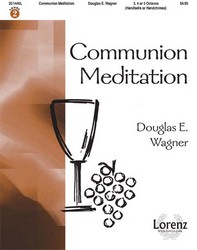Scripture References:
st. 1 = Isa. 61:10, Rev. 21:3
st. 2 = Rev. 3:20
st. 4 = Rev. 19:9
The first stanza of "Schmücke dich, O liebe Seele" by Johann Franck was published in Johann Crüger's Geistliche Kirchen-Melodien (1649). Crüger and C. Runge published the complete hymn in nine stanzas in their 1653 Gesangbuch. The hymn has since appeared in virtually all German hymnals and in many English language ones. The English text in the Psalter Hymnal is a revision of select stanzas from two translations by Catherine Winkworth (PHH 194), one published in her Lyra Germanica (2nd series, 1858) and the other in her Chorale Book far England (1863). Winkworth's first line read "Deck thyself, my soul, with gladness."
The dominant tone of this text is one of deep joy enhanced by a sense of awe. We express joy and praise for "this wondrous banquet" (st. 1), and we show reverence in receiving Christ (st. 2). Thankful for "heavenly food" and drink (st. 3), we rejoice in Christ's love for us and in its power to unite us (st. 4). Often considered the best and most popular of the Lutheran chorales for the Lord's Supper, this text, according to John Julian,
is an exhortation to the soul to arise and draw near to partake of the Heavenly Food and to meditate on the wonders of Heavenly Love; ending with a prayer for final reception at the Eternal Feast.
-A Dictionary of Hymnology (2nd ed., 1907), p. 1014
Johann Franck (b. Guben, Brandenburg, Germany, 1618; d. Guben, 1677) was a law Student at the University of Köningsberg and practiced law during the Thirty Years' War. He held several positions in civil service, including councillor and mayor of Guben. A significant poet, second only to Paul Gerhardt (PHH 331) in his day, Fran wrote some 110 hymns, many of which were published by his friend Johann Cruüer in various editions of the Praxis Pietatis melica. All were included in the first part of Franc Teutsche Gedichte bestehend im geistliche Sion (1672).
Liturgical Use:
Lord's Supper–probably most effective during distribution of the bread and wine.
--Psalter Hymnal Handbook
Hymnary Pro Subscribers
Access
an additional article
on the Canterbury Dictionary of Hymnology:
Hymnary Pro subscribers have full access to the Canterbury Dictionary of Hymnology.
Get Hymnary Pro


 My Starred Hymns
My Starred Hymns








